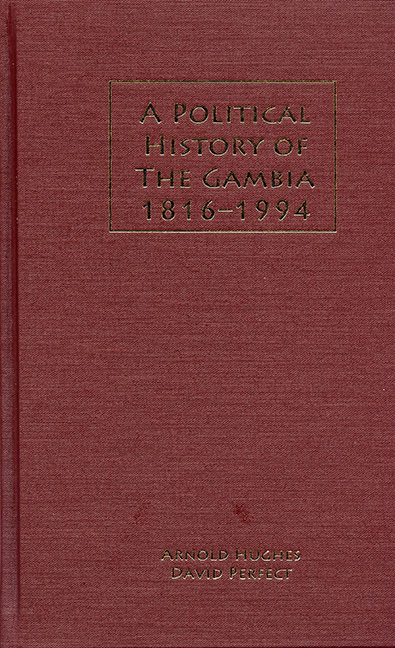Book contents
- Frontmatter
- Dedication
- Map
- Contents
- List of Tables
- List of Interviewees
- Acknowledgments
- Abbreviations
- Introduction
- 1 Social and Economic Setting
- 2 Constitutional Change in The Gambia, 1816–1994
- 3 Merchants and Recaptives: The Origins of Modern Politics, 1816–86
- 4 Patrician Politics in the Era of the Forsters, 1886–1941
- 5 The Establishment of Party Politics, 1941–59
- 6 The “Green Uprising”: The Emergence of the People's Progressive Party, 1959–65
- 7 Electoral Politics, 1965–81
- 8 Radical and Insurrectionary Political Challenges, 1965–81
- 9 Electoral Politics, 1981–94
- 10 The Gambia's External Relations, 1965–94
- 11 The 1994 Coup and the Jawara Legacy
- Appendix A Major Constitutional Changes, 1816–1994
- Appendix B Legislative Council Election Results, 1947–54
- Appendix C General Election and By-Election Results, 1960–93
- Appendix D Presidential Election Results, 1982–92
- Appendix E Republic Referendum Results, 1970
- Appendix F Primary Sources
- Appendix G Newspapers and Magazines Consulted
- Notes
- Bibliography
- Index
- Rochester Studies in African History and the Diasora
10 - The Gambia's External Relations, 1965–94
Published online by Cambridge University Press: 13 April 2017
- Frontmatter
- Dedication
- Map
- Contents
- List of Tables
- List of Interviewees
- Acknowledgments
- Abbreviations
- Introduction
- 1 Social and Economic Setting
- 2 Constitutional Change in The Gambia, 1816–1994
- 3 Merchants and Recaptives: The Origins of Modern Politics, 1816–86
- 4 Patrician Politics in the Era of the Forsters, 1886–1941
- 5 The Establishment of Party Politics, 1941–59
- 6 The “Green Uprising”: The Emergence of the People's Progressive Party, 1959–65
- 7 Electoral Politics, 1965–81
- 8 Radical and Insurrectionary Political Challenges, 1965–81
- 9 Electoral Politics, 1981–94
- 10 The Gambia's External Relations, 1965–94
- 11 The 1994 Coup and the Jawara Legacy
- Appendix A Major Constitutional Changes, 1816–1994
- Appendix B Legislative Council Election Results, 1947–54
- Appendix C General Election and By-Election Results, 1960–93
- Appendix D Presidential Election Results, 1982–92
- Appendix E Republic Referendum Results, 1970
- Appendix F Primary Sources
- Appendix G Newspapers and Magazines Consulted
- Notes
- Bibliography
- Index
- Rochester Studies in African History and the Diasora
Summary
At independence in February 1965, the Gambian government, like its counterparts in many other small states created out of randomly constructed former colonial dependencies, faced three major immediate and longer term challenges: to defend the country's national sovereignty, to promote economic and social development, and to ensure its own survival. An effective foreign policy was seen as an essential tool by which these challenges could successfully be met.
Despite its unpromising political and economic situation at independence, Prime Minister (later President) Sir Dawda Jawara skillfully ensured that The Gambia achieved its primary foreign policy objective of retaining its sovereignty, albeit with difficulty in the 1980s. Moreover, by gradually developing good relations with a wide range of countries, including fellow African and fellow Muslim states, as well as with developed countries and communist states, Jawara made a major contribution to The Gambia's limited resources through securing substantial external aid; thus the second foreign policy aim was also fulfilled. To some extent, the third objective was also achieved, since the government's foreign policy making generally buttressed its domestic political standing and, more specifically, ensured that Senegal despatched troops to suppress the 1981 coup. But ultimately this objective was not met, since Jawara's high standing internationally failed to secure external intervention the second time his government was confronted by a coup in July 1994.
Characteristics of Decision Making in Foreign Policy
Before independence, only a few Gambians had any experience of foreign policy making. As early as November 1960, Jawara, P. S. N'Jie and Omar M'Baki held discussions with the new Senegalese president, Léopold Senghor, in Dakar. When chief minister in 1961, N'Jie initiated talks with the Senegalese government, and Jawara extended these responsibilities when the colony obtained internal self-government in 1963. He was able to develop the process of establishing links with other African leaders, but it was only in 1965 that decision making became an entirely Gambian responsibility. Even then, inexperience and lack of resources led the new Gambian administration to turn to the British government and its local representative (the British high commissioner) for both formal and informal advice and assistance. In addition, in December 1966, Jawara appointed K. W. J. (Winton) Lane (a British expatriate who was previously his permanent secretary) as his special adviser.
- Type
- Chapter
- Information
- A Political History of the Gambia, 1816–1994 , pp. 251 - 279Publisher: Boydell & BrewerPrint publication year: 2006

